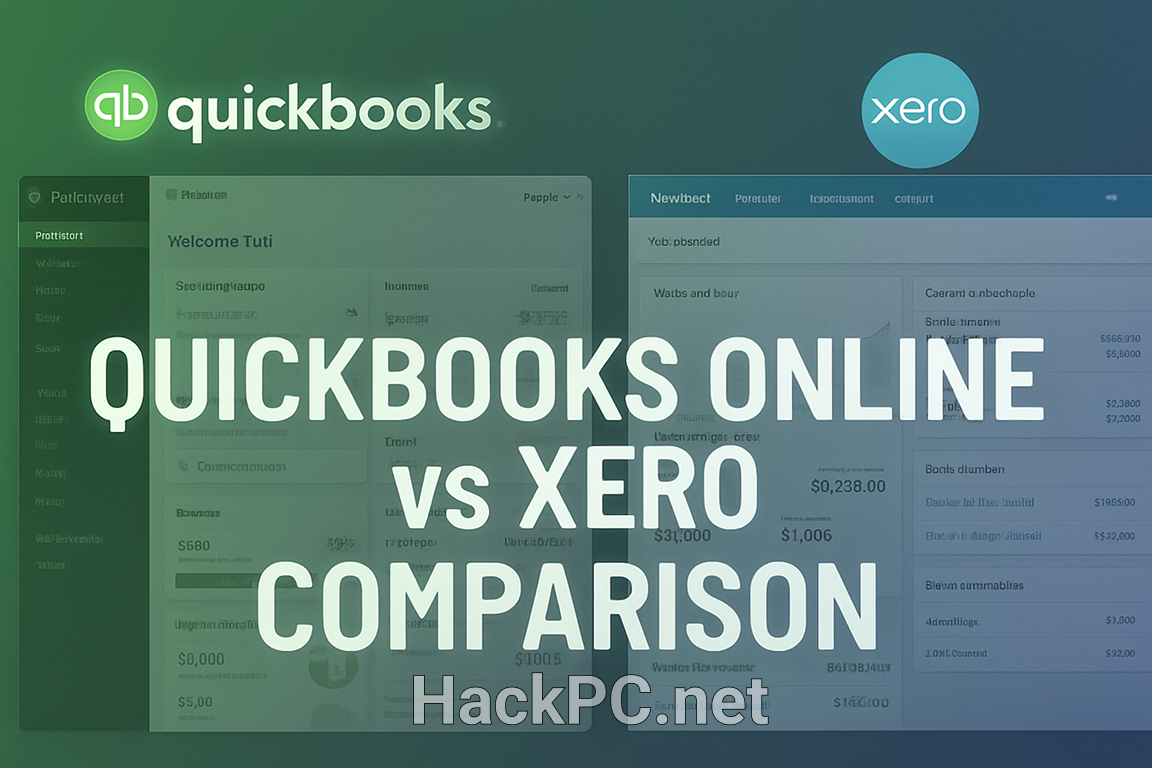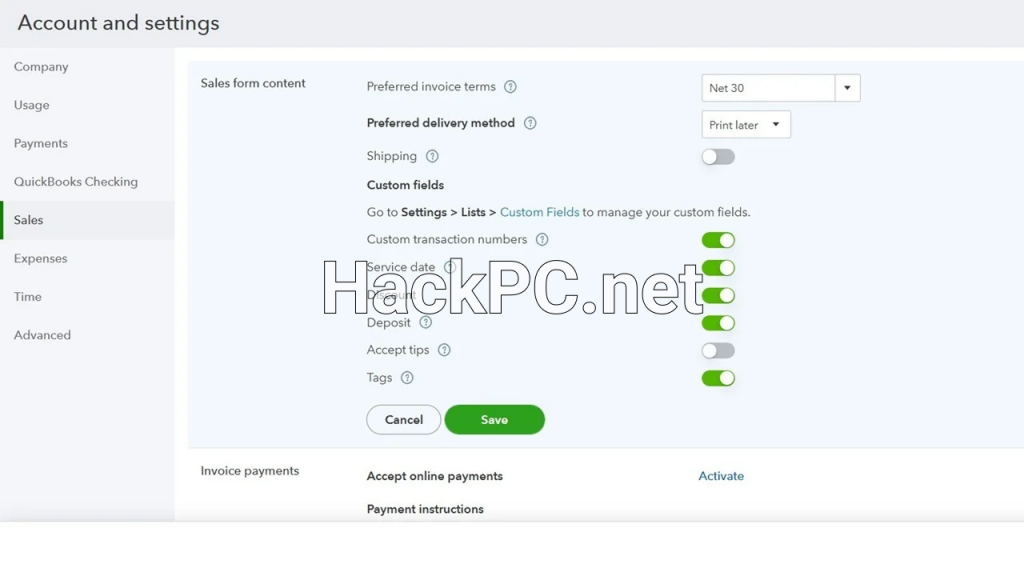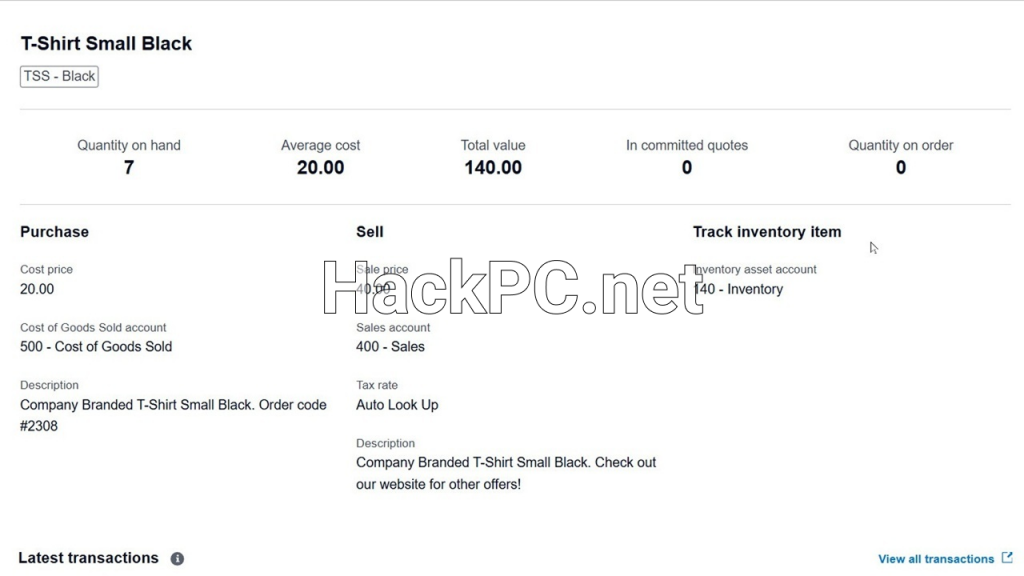
When it comes to cloud-based accounting software for small businesses, the QuickBooks Online versus Xero debate isn’t just about features and pricing—it’s about choosing the financial backbone that will power your business growth. Having analyzed both platforms extensively through 2025’s latest updates, I’m here to decode which solution truly delivers for modern businesses navigating an increasingly complex financial landscape.
The Stakes Have Never Been Higher
In 2025, small business accounting software has evolved far beyond simple bookkeeping. These platforms now serve as comprehensive financial command centers, integrating artificial intelligence, predictive analytics, and real-time cash flow forecasting. With QuickBooks processing transactions for over 7 million businesses and Xero serving 4 million subscribers globally, choosing between them can significantly impact your operational efficiency and bottom line.
Market Position & Evolution
QuickBooks Online: The Established Powerhouse
QuickBooks Online represents three decades of accounting software evolution. Since its desktop origins in 1992, Intuit has methodically transformed QuickBooks into a cloud-first ecosystem that dominates the North American market. The 2025 iteration introduces Intuit Assist, an AI-powered suite that automates invoice generation, expense categorization, and financial insights—reducing manual data entry by up to 40%.
The platform’s market dominance isn’t accidental. QuickBooks has cultivated an extensive network of ProAdvisors, ensuring local bookkeeping support is readily available across the United States. This ecosystem advantage proves particularly valuable for businesses requiring hands-on assistance with complex tax compliance or multi-state operations.
Xero: The Global Challenger
Xero’s cloud-native architecture, built from scratch in 2006, offers a fundamentally different approach. Without legacy desktop constraints, Xero delivers a cleaner, more intuitive interface that international businesses and digital-first startups find particularly appealing. The platform’s unlimited user model and strong multi-currency support make it especially attractive for growing teams and companies operating across borders.
Recent 2025 updates showcase Xero’s commitment to automation and global scalability, including enhanced cryptocurrency accounting integrations and AI-enhanced bill payment workflows that adapt to international transaction patterns.
Pricing Architecture: The Real Cost of Cloud Accounting
QuickBooks Online Pricing Structure (2025)
QuickBooks Online’s tiered pricing reflects its feature-rich approach, though recent increases have sparked discussion among cost-conscious businesses:
Solopreneur Plan ($20/month, currently $10/month for first 3 months)
- Designed for freelancers filing Schedule C
- Track income, expenses, and mileage
- Send unlimited invoices
- Single user access
- Basic financial reporting
Simple Start ($38/month, currently $19/month promotional)
- Double-entry accounting system
- Connect one bank account
- Unlimited invoices and estimates
- Receipt capture and organization
- Single user with two accountant users
Essentials ($65/month, currently $32.50/month promotional)
- Everything in Simple Start
- Bill management and time tracking
- Three total users
- Enhanced reporting capabilities
- Multiple bank connections
Plus ($99/month, currently $49.50/month promotional)
- Inventory management with reorder points
- Project profitability tracking
- Five total users
- Class and location tracking
- Budgeting tools
Advanced ($235/month, currently $117.50/month promotional)
- Custom user permissions
- Dedicated account team
- Advanced reporting with Excel integration
- Batch invoice processing
- 25 total users

Xero Pricing Philosophy (2025)
Xero’s approach prioritizes simplicity and scalability, with all plans including unlimited users—a significant differentiator for collaborative teams:
Early Plan ($13/month with periodic promotions)
- 20 invoices and 5 bills monthly
- Bank reconciliation
- Capture receipts via mobile app
- Short-term cash flow reports
- Unlimited users at no extra cost
Growing Plan ($37/month)
- Unlimited invoices and bills
- Bulk reconciliation features
- Purchase order management
- Enhanced financial reporting
- Project tracking basics
Established Plan ($70/month)
- Multi-currency accounting
- Advanced analytics dashboard
- Expense claim management
- Project profitability analysis
- Comprehensive reporting suite
Feature Deep Dive: Where Each Platform Excels
Bank Reconciliation & Automation
Both platforms offer automated bank feeds, but their approaches differ significantly. QuickBooks Online’s bank reconciliation leverages machine learning to categorize transactions with increasing accuracy over time. The platform’s Rules feature allows complex automation scenarios, automatically categorizing recurring transactions and splitting payments across multiple accounts.
Xero’s bank reconciliation feels more streamlined, particularly for high-volume transactions. The bulk reconciliation tools and intelligent matching algorithms reduce manual intervention, making it especially efficient for businesses processing hundreds of transactions monthly. Xero’s automated bank feed connections update daily, ensuring real-time accuracy in financial reporting.
Invoice Management & Payment Processing
QuickBooks Online’s invoicing system integrates deeply with its payment processing infrastructure, supporting ACH transfers, credit cards, and even cryptocurrency payments through third-party integrations. The platform’s automated payment reminders and recurring invoice templates minimize accounts receivable management overhead.
Xero counters with elegant invoice customization options and superior international payment gateway support. The platform’s automated payment reminders and online payment links consistently help businesses achieve faster payment cycles, with 81% of small business customers reporting improved payment timing.
Inventory Management Capabilities
Here’s where strategic differences become apparent. QuickBooks Online reserves comprehensive inventory management for its Plus tier and above, including features like:
- Real-time stock level tracking
- Automatic reorder point alerts
- FIFO/LIFO costing methods
- Bundle product creation
- Multi-location inventory tracking
Xero includes basic inventory management across all plans, democratizing this essential feature for smaller businesses. While lacking QuickBooks’ advanced capabilities like automated reordering or complex assembly tracking, Xero’s approach ensures even entry-level users can track product quantities and costs effectively.
Payroll Integration & Processing
QuickBooks Payroll integrates seamlessly as a native add-on, starting at $45/month plus $5 per employee. The integration handles:
- Automatic tax calculations and filings
- Direct deposit processing
- Employee self-service portals
- Time tracking integration
- Compliance management across all 50 states
Xero partners with Gusto for U.S. payroll processing, starting at $39/month base plus $6 per employee. While this third-party approach adds complexity, Gusto’s specialized focus often delivers superior payroll features, including:
- Comprehensive benefits administration
- Advanced HR tools
- Automated compliance updates
- Employee onboarding workflows
Reporting & Analytics Evolution
QuickBooks Online’s reporting capabilities reflect decades of refinement. The platform offers over 100 customizable report templates, with the Advanced tier providing:
- Custom field creation
- Advanced filtering and grouping
- Excel integration for complex analysis
- Automated report scheduling
- Multi-company consolidated reporting
Xero’s reporting focuses on visual clarity and accessibility. The Business Snapshot and Cash Flow Statement provide immediate insights without overwhelming non-financial users. The 2025 Analytics Plus add-on introduces predictive cash flow modeling and customizable KPI dashboards, though it requires additional investment beyond base pricing.

The AI Revolution: Automation in 2025
QuickBooks Intuit Assist
QuickBooks’ AI implementation demonstrates mature integration across the platform:
- Intelligent Invoice Creation: Copy-paste email content to generate invoices automatically
- Smart Categorization: AI learns from your categorization patterns, achieving 90%+ accuracy
- Predictive Insights: Proactive alerts about cash flow issues or unusual transactions
- Natural Language Queries: Ask questions like “What were my top expenses last quarter?” for instant answers
Xero’s Machine Learning Approach
Xero’s AI strategy emphasizes practical automation:
- Suggested Coding: Learns from historical data to pre-fill transaction details
- Smart Payment Matching: Automatically matches invoices with bank deposits
- Predictive Text: Autocompletes customer details and transaction descriptions
- Anomaly Detection: Flags unusual transactions or potential errors
Mobile Experience: Accounting On-The-Go
Both platforms offer robust mobile applications, but with different strengths:
QuickBooks Mobile excels in:
- Complete invoice creation and editing
- Mileage tracking with GPS automation
- Receipt scanning with data extraction
- Real-time profit and loss viewing
- Check deposit via photo
Xero Mobile prioritizes:
- Expense claim submission and approval
- Bank reconciliation on mobile
- Invoice creation with payment links
- Dashboard snapshots
- Multi-company switching
Integration Ecosystem: Building Your Tech Stack
QuickBooks Online Integrations
With over 750 integrated applications, QuickBooks offers extensive connectivity:
- E-commerce: Native Shopify, Amazon, and eBay synchronization
- Payments: Square, PayPal, and Stripe integration
- CRM: Salesforce, HubSpot connectivity
- Expense Management: Expensify, Concur integration
- Project Management: Asana, Monday.com synchronization
Xero App Marketplace
Xero’s 1,000+ app ecosystem emphasizes quality over quantity:
- Industry-Specific: Specialized apps for retail, construction, nonprofits
- Workflow Automation: Zapier, IFTTT connectivity
- Document Management: Dropbox, Google Drive integration
- Time Tracking: TSheets, Harvest synchronization
- Inventory: TradeGecko, DEAR Systems for advanced needs
Customer Support: When You Need Help
QuickBooks Support Infrastructure
QuickBooks provides tiered support based on your subscription:
- Live Phone Support: 6 days a week for all paid plans
- Chat Support: Extended hours including weekends
- Screen Share Assistance: For complex troubleshooting
- ProAdvisor Network: Local expert assistance available
- QuickBooks Live: Add-on bookkeeping services
Xero Support Approach
Xero emphasizes self-service with selective human support:
- 24/7 Online Resources: Comprehensive help center
- Xero Central: Community forums and discussion
- Email Support: Business hours response
- Partner Directory: Certified advisor network
- Onboarding Specialists: U.S.-based setup assistance
Security & Compliance: Protecting Your Financial Data
Both platforms maintain bank-level security standards:
Shared Security Features:
- 256-bit SSL encryption
- Multi-factor authentication
- Automatic data backups
- PCI DSS compliance
- SOC 2 Type II certification
- GDPR compliance for international users
QuickBooks Additional Security:
- Audit trail tracking all changes
- User activity monitoring
- Custom permission levels
- IP restriction capabilities
Xero Security Advantages:
- Continuous data backup
- Read-only user permissions
- Two-step authentication enforcement
- Login audit reporting
Industry-Specific Considerations
Best for Service Businesses
QuickBooks Online edges ahead with:
- Superior time tracking integration
- Project profitability analysis
- Billable expense tracking
- Client portal capabilities
Best for E-commerce
QuickBooks Online dominates with:
- Native marketplace integrations
- Automated sales tax calculation
- Multi-channel inventory sync
- Advanced reporting for online sales
Best for International Business
Xero clearly wins with:
- Native multi-currency support at lower tiers
- Global payment gateway compatibility
- International compliance features
- Unlimited users for distributed teams
Best for Startups
Xero appeals through:
- Lower entry costs
- Unlimited user scalability
- Clean, intuitive interface
- Strong automation features
The Conversion Question: Switching Platforms
Migrating from QuickBooks to Xero
Xero provides dedicated migration tools and support:
- Automated data import for transactions
- Historical data conversion services
- U.S.-based onboarding team assistance
- Parallel run capabilities for transition period
Moving from Xero to QuickBooks
QuickBooks offers comprehensive switching support:
- ProAdvisor migration assistance
- Data import wizards
- Training resources for team transition
- Discounted onboarding services
2025 Roadmap: What’s Coming Next
QuickBooks Future Developments
- Enhanced AI-powered financial forecasting
- Deeper automation for repetitive tasks
- Expanded cryptocurrency support
- Advanced sustainability reporting
- Improved multi-entity management
Xero Innovation Pipeline
- Predictive analytics expansion
- Enhanced machine learning categorization
- Blockchain integration for audit trails
- Carbon footprint tracking
- Advanced project management features
Making the Decision: A Strategic Framework
Choose QuickBooks Online If:
✅ You need comprehensive features in a single platform
✅ Local bookkeeper support is important
✅ You operate primarily in the United States
✅ Advanced inventory management is crucial
✅ You prefer native payroll integration
✅ Complex reporting requirements exist
✅ You’re already in the Intuit ecosystem
Choose Xero If:
✅ Unlimited users are essential for your team
✅ International operations require multi-currency support
✅ Cost-effectiveness is a primary concern
✅ You prefer a cleaner, simpler interface
✅ Your business is growing rapidly
✅ You operate globally or plan expansion
✅ Automation and efficiency trump feature depth
The Hidden Costs: Beyond Subscription Fees
QuickBooks Additional Expenses:
- Payroll services: $45+/month
- Payment processing: 2.9% + $0.30 per transaction
- Additional users: $10-70/month depending on plan
- Advanced apps and integrations
- ProAdvisor consultation fees
Xero Hidden Costs:
- Payment processing fees through third parties
- Payroll via Gusto: $39+/month
- Analytics Plus add-on: Additional monthly cost
- Premium app integrations
- Currency conversion fees
Real-World Performance: User Testimonials
According to recent G2 reviews and platform analysis, users consistently highlight:
QuickBooks Strengths:
- “Comprehensive reporting gives us insights we never had before”
- “The learning curve is worth it for the depth of features”
- “Customer support actually answers the phone”
Xero Advantages:
- “After using Xero, I now prefer it over QuickBooks”
- “The unlimited users feature is a game-changer for our growing team”
- “Bank reconciliation is incredibly efficient”
The Verdict: Context Determines the Winner
In 2025’s dynamic business environment, neither QuickBooks Online nor Xero claims absolute superiority—each excels within specific contexts. QuickBooks Online’s maturity, comprehensive features, and extensive support network make it ideal for established businesses requiring sophisticated financial management tools. Its deep U.S. market integration and native functionality reduce the need for third-party solutions.
Xero’s modern architecture, unlimited user model, and global focus position it perfectly for startups, international businesses, and rapidly scaling teams. The platform’s emphasis on automation and user experience over feature complexity appeals to businesses prioritizing efficiency over exhaustive functionality.
Final Recommendations
For Micro-Businesses (1-3 employees)
Winner: Xero Early Plan The combination of low cost, unlimited users, and essential features provides unmatched value.
For Growing Startups (4-15 employees)
Winner: Xero Growing Plan Unlimited users and scalable features support rapid growth without per-user penalties.
For Established Small Businesses (15-50 employees)
Winner: QuickBooks Online Plus/Advanced Comprehensive features, local support, and mature ecosystem justify higher costs.
For Service Businesses
Winner: QuickBooks Online Plus Superior project tracking and time management capabilities deliver measurable ROI.
For E-commerce Operations
Winner: QuickBooks Online Plus Native marketplace integrations and inventory management provide competitive advantages.
For International Operations
Winner: Xero Established Multi-currency support and global payment compatibility are essential for cross-border success.
The Future of Cloud Accounting
As we progress through 2025, both platforms continue evolving rapidly. The integration of artificial intelligence, blockchain technology, and predictive analytics promises to transform basic bookkeeping into strategic financial intelligence. Whether you choose QuickBooks Online’s feature-rich ecosystem or Xero’s streamlined efficiency, ensure your decision aligns with your business trajectory, not just current needs.
The ultimate truth? The best accounting software is the one your team will actually use effectively. Consider running parallel trials of both platforms—most businesses find their preference becomes clear within weeks of hands-on experience. Your financial management system forms the foundation of business intelligence; choose wisely, but remember that either platform represents a massive upgrade from spreadsheets or desktop software.
In this era of digital transformation, the question isn’t whether to adopt cloud accounting—it’s which platform will best accelerate your business growth. Both QuickBooks Online and Xero have proven their worth; your unique business context determines the optimal choice.



Comments (0)